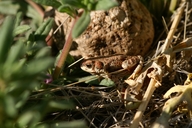|
Description
This small toad (ranging from 38-76 mm total length) is described as having a flattened, short sub-triangular head with a pointed snout. It is the only North American toad that has small, round parotoid glands the same size as the eye plus weak or absent cranial crests (Korky 1999).
The coloration is gray or light to medium brown, with reddish to orangish warts and a white ventral stripe; sometimes the stripe has spotting (Conant and Collins 1991; Stebbins 1985) .
Korky (1999) also states, "this species is the only North American toad with round parotoids about the same size as the eye, and with cranial crests notabely weak or absent."
Distribution and Habitat
Country distribution from AmphibiaWeb's database: Mexico, United States U.S. state distribution from AmphibiaWeb's database: Arizona, California, Colorado, Kansas, New Mexico, Nevada, Oklahoma, Texas, Utah
In the USA, the northern extent of the range is from southeastern
California east to southern Nevada, into Utah, Colorado and the
southwestern region of the state of Kansas. It occurs as far south as the tip of the
Baja California Penninsula, Mexico, and on the Mexican mainland, down to the
state of Hidalgo (Stebbins 1985) . This toad lives in rough, rocky
regions and open grasslands. It can be found near springs, seepages and
persisting pools
in the desert and in rocky crevices
(Storer 1925; Conant and Collins 1991; Stebbins 1985) .
This toad ranges in elevation from near sea level to 2,000 m
(Stebbins 1985).
Life History, Abundance, Activity, and Special Behaviors
Like the other toads in this group, the red-spotted toad is an explosive breeder.
The eggs are laid in early April and tadpoles metamorphose within a season.
Males have melodious
call and may form breeding choruses of 2-6 males. Males actively search for
females as well (Sullivan 1984).
Comments
Hybrids with other bufonid species have been found in nature (Sullivan 1990).
Many late Pleistocene and Holocene fossils have been recovered for this species at numerous sites in Nevada, New Mexico, Arizona, California, Texas as well as in Sonora,
Mexico (for complete references please see Korky 1999).
Korky (1999) has provided a long literature list for this species.
See another account at californiaherps.com.
References
Conant, R. and Collins, J. T. (1991). A Field Guide to Reptiles and Amphibians: Eastern/Central North America. Houghton Mifflin, Boston.
Korky, J. K. (1999). ''Bufo punctatus.'' Catalogue of American Amphibians and Reptiles. Society for the Study of Amphibians and Reptiles, 689.1-689.5.
Stebbins, R. C. (1985). A Field Guide to Western Reptiles and Amphibians. Houghton Mifflin, Boston.
Storer, T. I. (1925). "A synopsis of the amphibia of California." University of California Publications in Zoology, 27, 1-342.
Sullivan, B. K. (1984). ''Advertisement call variation and observations on breeding behavior of Bufo debilis and Bufo punctatus.'' Journal of Herpetology, 18, 406-411.
Sullivan, B. K. (1990). ''Natural hybrid between the Great Plains Toad, Bufo cognatus and the Red-Spotted Toad, Bufo punctatus from Central Arizona, USA.'' Great Basin Naturalist, 50, 371-372.
Originally submitted by: Lauren M. Chan (first posted 1999-02-16)
Edited by: Vance T. Vredenburg, Kellie Whittaker (2020-02-12)Species Account Citation: AmphibiaWeb 2020 Anaxyrus punctatus: Red-Spotted Toad <https://amphibiaweb.org/species/260> University of California, Berkeley, CA, USA. Accessed Jun 12, 2025.
Feedback or comments about this page.
Citation: AmphibiaWeb. 2025. <https://amphibiaweb.org> University of California, Berkeley, CA, USA. Accessed 12 Jun 2025.
AmphibiaWeb's policy on data use.
|
